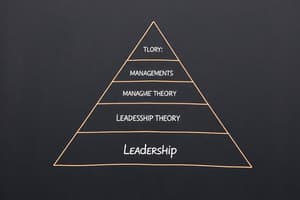Podcast
Questions and Answers
Efficiency means doing the right things to attain organizational goals.
Efficiency means doing the right things to attain organizational goals.
False (B)
Effectiveness involves getting the most output for the least inputs.
Effectiveness involves getting the most output for the least inputs.
False (B)
Managers perform functions such as planning, organizing, leading, and controlling.
Managers perform functions such as planning, organizing, leading, and controlling.
True (A)
Mintzberg identified 5 roles grouped around interpersonal relationships, the transfer of information, and decision making.
Mintzberg identified 5 roles grouped around interpersonal relationships, the transfer of information, and decision making.
Planning involves working with and through people to accomplish goals.
Planning involves working with and through people to accomplish goals.
Organizing includes arranging and structuring work to accomplish organizational goals.
Organizing includes arranging and structuring work to accomplish organizational goals.
One of the managerial roles is related to decision making.
One of the managerial roles is related to decision making.
Efficiency focuses on defining goals and establishing strategies.
Efficiency focuses on defining goals and establishing strategies.
Controlling involves monitoring, comparing, and correcting work.
Controlling involves monitoring, comparing, and correcting work.
Leading is primarily related to monitoring work progress.
Leading is primarily related to monitoring work progress.
Flashcards are hidden until you start studying
Study Notes
- Management involves coordinating and overseeing the work activities of others for organizational goal accomplishment.
- Managers are classified into three levels: First-line, Middle, and Top.
- Women's representation in managerial positions varies around the world: Australia (41.9%), Canada (36.3%), Germany (35.6%), Japan (10.1%), Philippines (57.8%), United States (50.6%), and some countries do not have data (N/A).
- According to Mintzberg, management roles can be categorized into interpersonal, informational, and decisional: Figurehead, leader, liaison, monitor, disseminator, spokesperson, entrepreneur, disturbance handler, resource allocator, and negotiator.
- Management skills include: technical skills, human skills, and conceptual skills.
- Technical skills involve knowledge and proficiency in a specific field.
- Human skills concern the ability to work well with other people.
- Conceptual skills enable the ability to think and conceptualize about complex and abstract organizational situations.
- Managerial concerns revolve around efficiency (doing things right) and effectiveness (doing the right things).
- Mintzberg identified three approaches to defining what managers do: functions they perform, roles they play, and skills they need.
- Functions that managers perform include planning, organizing, leading, and controlling.
- Planning involves defining goals, establishing strategies, and developing plans.
- Organizing refers to arranging and structuring work.
- Leading involves working with and through people.
- Controlling involves monitoring, comparing, and correcting work.
- Roles manager's play are specific actions or behaviors expected of a manager, grouped around interpersonal relationships, transfer of information, and decision making.
Studying That Suits You
Use AI to generate personalized quizzes and flashcards to suit your learning preferences.




